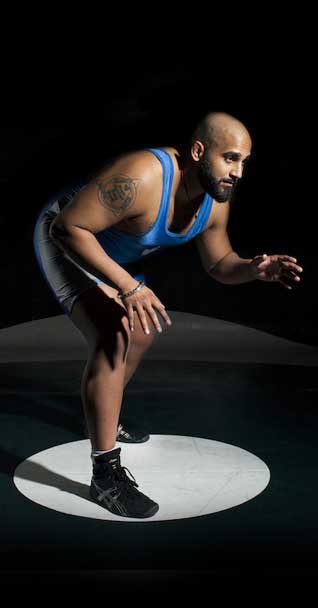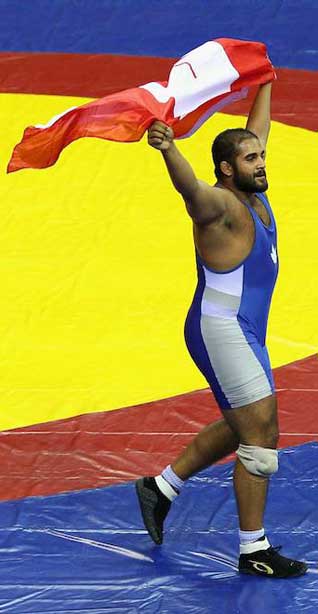Sports
'The Human Body Is A Special Instrument':
Canadian Olympian Arjan Singh Bhullar
SCOTT STINSON
Arjan Singh Bhullar was a collegiate wrestling and Commonwealth Games champion who retired after representing Canada at the 2012 Olympics. He made the switch to Mixed Martial Arts (‘MMA), and after a 6-0 record was recently signed by Ultimate Fighting Championship (‘UFC‘).
Arjan Singh, 31, spoke with Postmedia’s Scott Stinson about family, breaking barriers, and getting punched in the face.
* * * * *
Q: You learned wrestling techniques on the family farm in Richmond, British Columbia, Canada, correct?
A: The family history is that my father wrestled before me. The sport of wrestling, the art of wrestling, is part of tradition in Punjab in our culture. If you look at cave paintings that are thousands of years old, there are depictions of wrestling. So that came over with our family. My dad became my coach, and he taught myself and my brothers and my cousins. There were 10 of us, boys in the family, and we all wrestled, on the family farm here.
Q: There’s a history of family-farm wrestling in Canada, obviously, with the Harts in Calgary. You had 10 boys all training there, it must have been quite the scene.
A: It was a lot of testosterone and blood, sweat and tears, but at the end of the day when you went to go compete everyone was in your corner. It really has been the common denominator for our family as people have grown and started their own family and ventured off, the gym and well-being and the spirit of wrestling is still a common denominator.
Q: Did anyone get hurt?
A: Oh, for sure. We’ve had broken bones and ligaments and all that, but that’s part of the experience that bonded us together.
Q: You had the hospital on speed dial.
A: Exactly. When you were younger, it was just ‘shake it off,’ the old-school method of just wrapping it up and saying ‘you’ll be okay.’ But now you look back and think, what the hell were we thinking? I remember one time, my cousin, he severed his toe. It was hanging by the skin and we had to rush him to hospital. My dad wrapped it up with socks. And that was sort of holding it together.
Q: I hope the socks were clean, at least.
A: No. I don’t remember whose socks we used. It was mostly to keep the blood off the mats, really.
Q: After the loss at London 2012, did you keep wrestling, or did you decide to retire then?
A: Before the Commonwealth Games in 2010 and through the Olympics in 2012 I could see that many of the people I had competed against or trained with had already made the transition. I had done this since I was in diapers. It wasn’t that I was tired of it, I felt I had more to offer. So headed into the Olympics I knew that was my last wrestling event.
Q: There are obviously skills that translate from freestyle wrestling to MMA, but there’s also a violent component. You are trying to knock people out. Was that adjustment hard?
A: I never got in fights growing up, I was never a bully. But in terms of the transition, the human body is a special instrument. It can adapt to any new situation and that’s what’s really happened here. I put myself in that environment and I’ve learned to thrive under it.
Q: Do you have to be more conscious of being more aggressive in the ring, or is it a similar mentality, but with different skills?
A: It’s the same exact mindset. The way you train, the way you compete, all of that is the same. It’s just a different type of opponent and a different skill set. As a wrestler, the biggest change was the striking. Jiu-jitsu and wrestling, they go hand in hand. It’s grappling at the end of the day. The striking was a big question mark.
Q: Was it weird the first time you had to punch someone in the face?
A: Very weird, man. Very weird. It was weird when we were training, and it was even more weird when people were watching you under the lights. There was that hesitation a touch, but that’s gone now. I think what helps is knowing that the other guy is trying to do the same thing to me, so I better get going.
Q: I know you are undefeated in MMA, but were you ever close to knocked out, or wobbled by a punch? Have you had that experience yet?
A: My first fight. Everything was so much quicker, and it was real all of sudden. I did take a good shot my first fight, but aside from that not much at all. I’ve won every round I’ve fought in my career so far. That’s a testament to the people around me.
Q: Are you wearing protective headgear during training in the same way that boxers do when they spar?
A: Yes, yes. It’s exactly like boxing where you have your gloves, your mouthguard and your headgear. The only difference for us is we also have shin pads because there’s a kicking component to it. In terms of safety and protection, there is quite a bit in terms of training but, at the end of the day it is a fight you are getting ready for.
Q: For the grappling and those parts of it, are you training the techniques? You’re not trying to submit your sparring partner, I wouldn’t think.
A: Before a fight, you try to get as close as you can to what we call ‘fight speed’ as possible. Before that you might focus on technical aspects, or certain moves at half speed. But as you get closer to a fight you want to go as fast as possible so you are not that far off. Heading into a fight, the intensity definitely does go up.
Q: Are you worried about the health risks of a sport where you are potentially getting punched in the face?
A: Obviously, that is a part of the game, it is a harsh reality. The way I look at it is, I’m not doing this because I can’t do anything else. I have other opportunities, so I’ll never be one of those guys that sticks around too long. I could walk away at any time. But, you know, I live passionately, and I’m able to get up in the morning and do what I want. This is a choice for me.
Q: You were the first Sikh-Canadian - actually the first from Punjab and the subcontinent - on the Olympic wrestling team and now the first such fighter in UFC. What does breaking that ground mean to you?
A: My goals and ambitions never had an asterisk where I wanted to be the first of anything. I wanted to be the best. But when I was growing up there weren’t other athletes I could aspire to be like that came from the same culture. So if I can be that for the next generation of kids, the Sikh and all other kids who are watching me, there’s nothing else you can ask for. That part is special.
Q: Did you have some bad experiences as a visible-minority athlete in a very white sport?
A: There were some challenges, I would say. Not just in Canada, but travelling the world as part of Team Canada. There were certain parts, Eastern Europe and such, where there were challenges if you had a different colour of skin. But as Sikhs, having turbans, having beards, our people have a history of standing out, and that’s what our religion is really about. And breaking barriers and being strong, and having that inner strength to overcome. I was always the youngest on Team Canada and I was the only Sikh or South Asian on the team, so there was a difference there, but the beauty of wrestling is it’s a one-on-one competition. You get your arm raised, you win.
Q: But there is judging. Did you ever find yourself in an arena where you thought they weren’t going to be open-minded about the dark-skinned wrestler?
A: Not only that, but there was also the fact that we were representing Canada. You go to Russia or Iran or a lot of those countries, and it’s assumed that you don’t have home-field advantage. I’m a proud Canadian, born and raised, but travelling abroad, whether it was the colour of my skin or the maple leaf, I knew we were going to face challenges. That’s assumed, and you overcome it anyway.
Q: You switched from one sport to another. Does Conor McGregor have a chance against Floyd Mayweather?
A: It’s two different sports altogether. In MMA you have to learn all these different skills. Mayweather is a specialist. And he’s a specialist among the specialists, he’s one of the best boxers ever. McGregor has trained for all these other aspects. To say he will be at a disadvantage would be an understatement. But anything can happen. But making $80 million to see if anything can happen, is something I think McGregor is okay with.
Q: Your first fight in UFC is when?
A: September 9, Rogers Arena, Edmonton, Alberta. It’s the first time UFC is going there. It’s only a 90-minute flight from home. The whole family is flying out. It’s going to be fun.
[Courtesy: The National Post. Edited for sikhchic.com]
July 3, 2017




